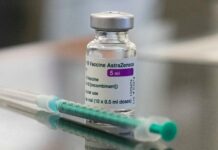Sixteen years since he was born, Musa is learning to walk again—on artificial limbs fitted on him after a bomb attack at his school cost him his legs.
He is one of 180 people since August last year fitted with artificial limbs under a free prosthesis programme by the International Committee of the Red Cross.
His family learned of the free prosthesis for victims of violence, three days after a blast damaged his leg.
Three months later, he got a new limb at the National Orthopaedic Hospital in Dala, Kano.
He was the youngest on the programme back then, and orthopaedic staff taught him to use his new limb.
“He found it very easy to cope,” his father Musa, whom the teenager is named after, says.
“After we were discharged, he used a stick for a while but soon dropped it and began to walk around unaided.”
He still thinks about his dream of playing football.
Black assembly
That dream dimmed on a school morning in November 2014 when a boy walked into Government Science Secondary School, Potiskum, with a bag.
For security reasons, bags were banned.
“We kept asking him why he was carrying a bag,” Musa recalls. “Then we heard a beeping sound, but we thought it was his phone.”
It was a bomb inside, and the blast ripped through the assembly hall where students had queued for morning assembly.
The bomber had come dressed as a student. His attack left 47 people dead, including the bomber. Another 79 were wounded.
Musa’s father, Musa, who lived in the staff quarters near the school, heard the bomb go off.
“I ran to the school and saw dead bodies everywhere and everyone running around confused. I started looking for my son,” he says, recalling the November 2014 attack.
He eventually found Musa in the emergency ward of Potiskum General Hospital. His son’s left leg had been blown off in the blast.
Back to hope
The project that helped Musa get a leg back only work with amputees refereed from ICRC health field offices in Adamawa, Borno and Yobe.
“This way, we are able to control what would otherwise be a huge demand for fittings,” says Jacques Forget, an ortho-prosthetist who oversees the project in Dala-Kano.
Forget currently works with six National Orthopedic Hospital staff and one ICRC staff, but he sees a need to improve their skills.
“Improving the technical know-how of the staff for me involves not just training them on how to fabricate and fit the amputees, but also helping them to see the patients as ‘beneficiaries,’ a mindset that personalizes their approach to the victims,” Forget said.
With a prosthetic limb, Musa had re-mastered walking and can move about unaided. He easily rides a three-wheeled bike his father bought him.
“He is young and he still feels the trauma sometimes. He gets angry sometimes but other times he is friendly with everyone,” Musa’s father says.
Musa, now 16, has dreams of continuing his studies at either the University of Maiduguri or the Federal University of Gusau.
Football is still a dream, though difficult now. But he stays connected to the sport by fervently supporting Barcelona football team.
“My favorite footballers are Messi and Neymar,” he says.



























